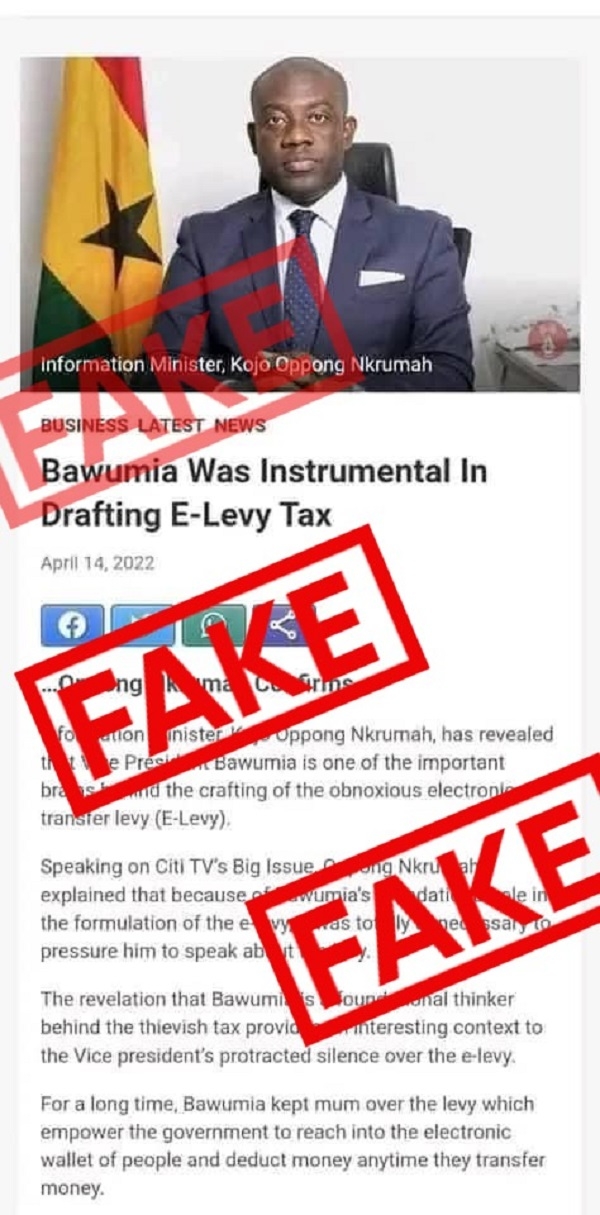Vice President Dr. Mahamudu Bawumia’s promise to cancel some controversial tax measures, if he is elected president come 2025, has become a matter of public discussion.
One of the said taxes is the Electronic Transfer Levy (E-Levy).
He made the promise while delivering his vision to Ghanaians on February 7, 2024. The particular promise has led to many questioning his involvement in the decision to implement these levies in the first place.
Also, some news articles on government functionaries, including the Minister of Information, Kojo Oppong Nkrumah, saying that the vice president was involved in the drafting of the E-Levy have surfaced, further deepening the conversations.
Claim:
The Ministry of Information in a post shared on X, on Wednesday, February 7, 2024, described a post of a news article of Oppong Nkrumah as fake.
The ministry shared a screenshot of the article that purported that their minister did not say that the vice president was part of the processes for the E-Levy implementation, with ‘FAKE’ stamps across the screenshot.
Explanation:
The headline of the article in question: “Bawumia Was Instrumental in Drafting E-Levy Tax” is inaccurate because the minister did not state that Vice President Bawumia was involved in the drafting of the levy.
Though the minister stated the involvement of the vice president in discussions on the levy, he did not say that he was involved in "drafting" it.
The article, which was written by ‘whatsupnewsghana.com’, was written from a 2022 Citi FM interview.
TWI NEWS

What Oppong Nkrumah said in the interview:
The minister, in the said interview, was explaining why Dr. Bawumia did not say much about the E-Levy in his address on the economy of Ghana in April 2022.
A faction of the public was unhappy with Dr. Bawumia’s failure to explain his position on the levy at the address because he had stated in a previous interview that he did not support it because it would affect the poor.
Oppong Nkrumah, while reacting to the concerns, mentioned that Dr. Bawumia was part of the discussion during the drafting of the E-Levy.
“I can understand why some people want him to do an elaborate talk. But it should not be missed that his presentation was the third in the series of presentations by the government dealing with various issues, and we’ve dealt extensively with the E-Levy, travelling from Takoradi, Koforidua, Wa, Ho and other places engaging the public, Parliament and using mass media platforms explaining the whys.
“We’ve been dealing with the fact that those two principal issues, first that digitization will not be compromised by E-Levy, and have responded to the second matter that deals with the poor. The Vice President himself was very instrumental and I don’t think I break my cabinet oath when I say this,” he said.
He added, “He was very instrumental in the cabinet meetings and the EMT meetings to ensure that, that his principal argument of protecting the poor was upheld, And that is why the threshold of a GH¢100, which accounts for about 40% of Momo transaction on a daily basis was excluded from this levy.”
Conclusion:
Even though the headline of the article is correct, some of its substances are not necessarily true.
Some parts of the article stated that Dr Bawumia was the ‘foundational thinker behind’ the levy but Oppong Nkrumah did explain that the vice president's involvement in the discussions was to ensure that the poor are excluded.
Also, its description of the levy as a “thievish tax” can not be accurate because the Parliament of Ghana legally passed it.
Verdict:
False
BAI/AE
You can also watch the latest episode of Everyday People on GhanaWeb TV below:
Ghana’s leading digital news platform, GhanaWeb, in conjunction with the Korle-Bu Teaching Hospital, is embarking on an aggressive campaign which is geared towards ensuring that parliament passes comprehensive legislation to guide organ harvesting, organ donation, and organ transplantation in the country.